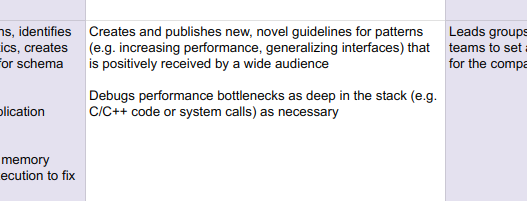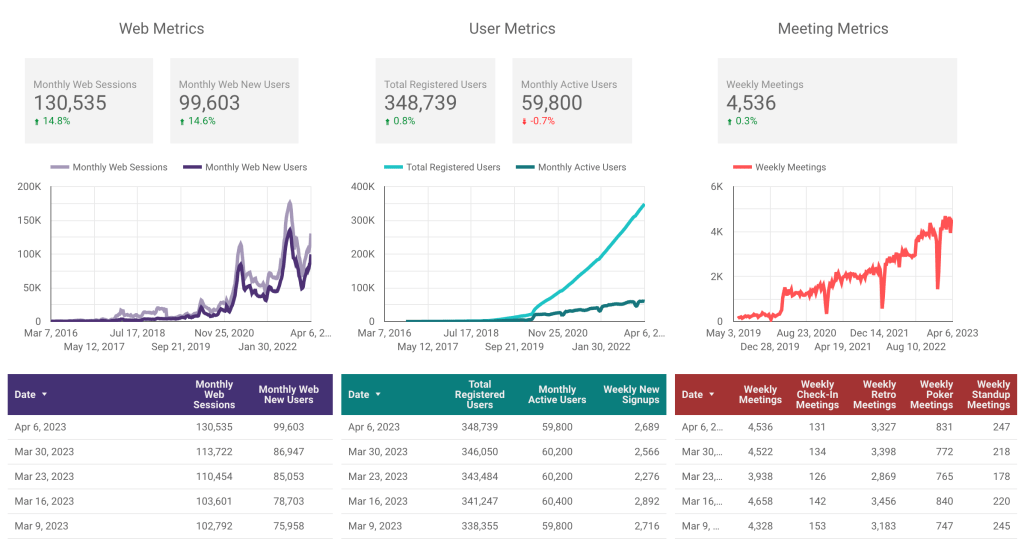#342 – How To Do Promotions Transparently
Friday Ship #342 | April 7th, 2023

This week I share my levelling experience at Parabol.
I recently earned a promotion at Parabol and it made me think about how the experience was totally different from what I’ve experienced in the past. Previously promotions were a result of setting annual performance targets with the manager, most of which were just team goals or ship feature X. Then at some point during one of the regular 1:1s with my manager I was told I got promoted. This process was totally opaque to me, I didn’t know who was involved in this decision and on what basis it was decided.
At Parabol, we wanted to create something different. When I joined, no-one was ever promoted, no process was yet put into place. So what’s the best way to start?
The first thing we did, was put a Member Feedback process in place. This involves creating a Parabol retro to collect feedback from the people you’ve worked most closely with.
What does Parabol value?
The next step in creating a framework for levelling and promotions, was writing down which qualities the company expects from an individual at a certain level, e.g. Senior Developer. We gathered feedback from all members and created a skill matrix that specifies the expected technical and cross-functional skills. Additionally we also created a policy on how to level in the cross-functional skill.
Let your tension be your guide
I wanted to be promoted but there was no policy on how to level in the developer skill area, i.e. how do you judge whether someone shows enough of a skill, so I started the governance process for this.

This wasn’t as easy as I hoped. How do you “usually show evidence” of debugging performance issues down to the C++ level? Sometimes these problems just don’t show up at the right times. So I went with a different approach of a simple shows evidence vs. shows evidence of absence. If you’re able to demonstrate some skills required, unless proven otherwise, you’re good. I went ahead and started the governance process [Fridayship 226] for this and promptly got some concerned reactions that this could lead to some people avoiding challenging work in the long run. I agreed with their concerns and considered abandoning the policy.
I got reminded that as the initiator of a governance process for a policy, my main focus should be solving my own tension. If other members think it is not safe to try this policy and it will cause immediate harm, they can object. Otherwise they can propose a change themselves in the future to modify my current proposal to also solve their tension.
The promotion
So I was ready to start the process. I selected my review panel, collected evidence for each of the skills and did a self evaluation. Each reviewer then did their own evaluation with the help of the evidence and evaluation I provided and then I got the results. I failed to meet all the criteria. I was very disappointed.
I talked with my manager Marcus Wermuth about what to do next. There were two areas I had to work on: sharing more with an external audience and strategic insights. Both of these are behavioural changes and thus take time to deliver consistently, but I just needed to show a bit more evidence to make it.
Luckily we were just starting work on a new goal and idea creation was an essential part of it. I also took time during my next 1:1 with our CEO Jordan Husney to get a better perspective on why these skills are important which helped me get motivated about improving those.
A few month later I thought I had improved enough to do a second try at the promotion process and this time I made it.
Right now we are already working on a new iteration of our levelling and promotion framework as we learned enough to improve:
- The current developer skill matrix is difficult to judge because for some skills there is not often the opportunity to demonstrate those so we’re governing a new version
- We want to have a new version of the developer promotion and levelling evaluation which should work better with the new skill matrix and which addresses the previous tension around avoiding challenging work
- I want to amend the current cross functional skill matrix to add a small section to make it clearer why we value certain skills
Metrics

We continue to see strong growth in our top-of-funnel metrics!
This week we…
…published the ASMR Scrum Guide
…welcomed Hicham Amine on the sales team
Next week we’ll
…roll out AI summaries for retrospectives
Have feedback? See something that you like or something you think could be better? Please write to us.
